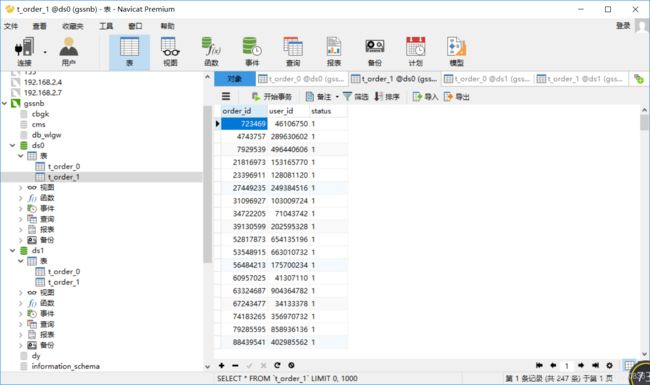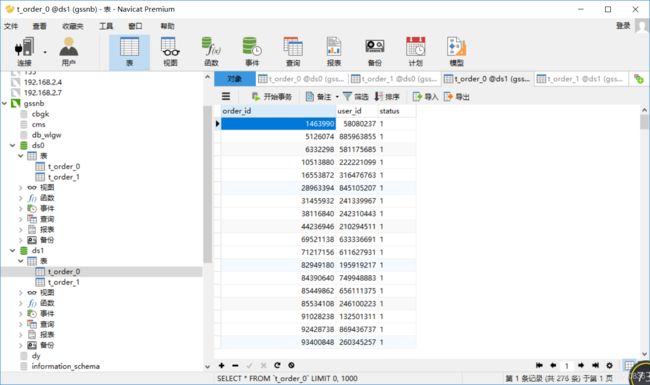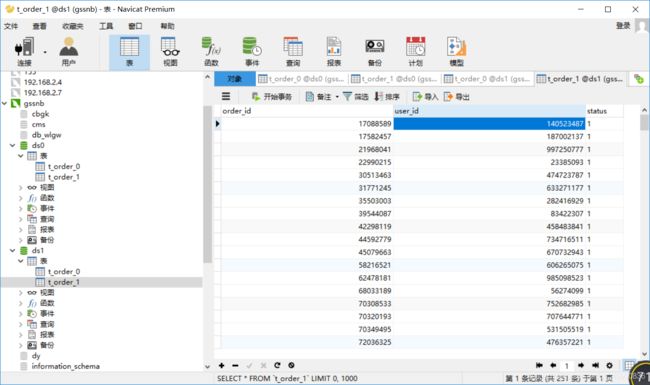SpringBoot整合Sharding-JDBC分库分表使用
SpringBoot整合Sharding-JDBC分库分表使用
最近在搞一个项目,数据量比较大,需要用到分库分表。于是看了一下这个Sharding-JDBC这个轻量级框架,使用的比较新的版本。百度的基本都是 3.x版本,我这边选择了 4.0.0-RC1的版本。根据官网的例子来改的。官网的文档确实有点坑,估计版本也是比较老的
Sharding-JDBC中文官网
项目地址
引入依赖
- 连接池选择 dbcp2
- mysql 的 驱动包
- 持久层选择 Jpa
- 分库分表选择
sharding-jdbc-core
<dependencies>
<dependency>
<groupId>org.apache.shardingspheregroupId>
<artifactId>sharding-jdbc-coreartifactId>
<version>4.0.0-RC1version>
dependency>
<dependency>
<groupId>org.apache.commonsgroupId>
<artifactId>commons-dbcp2artifactId>
<version>2.5.0version>
dependency>
<dependency>
<groupId>mysqlgroupId>
<artifactId>mysql-connector-javaartifactId>
dependency>
<dependency>
<groupId>org.springframework.bootgroupId>
<artifactId>spring-boot-starterartifactId>
dependency>
<dependency>
<groupId>org.springframework.bootgroupId>
<artifactId>spring-boot-starter-data-jpaartifactId>
dependency>
<dependency>
<groupId>org.springframework.bootgroupId>
<artifactId>spring-boot-starter-webartifactId>
dependency>
<dependency>
<groupId>org.springframework.bootgroupId>
<artifactId>spring-boot-starter-testartifactId>
<scope>testscope>
dependency>
<dependency>
<groupId>javax.persistencegroupId>
<artifactId>persistence-apiartifactId>
<version>1.0version>
dependency>
dependencies>
<build>
<plugins>
<plugin>
<groupId>org.springframework.bootgroupId>
<artifactId>spring-boot-maven-pluginartifactId>
plugin>
plugins>
build>
创建数据库
数据库 ds0
-- ----------------------------
-- Table structure for t_order_0
-- ----------------------------
DROP TABLE IF EXISTS `t_order_0`;
CREATE TABLE `t_order_0` (
`order_id` bigint(50) NOT NULL AUTO_INCREMENT,
`user_id` bigint(50) NOT NULL,
`status` varchar(50) DEFAULT NULL,
PRIMARY KEY (`order_id`)
) ENGINE=InnoDB AUTO_INCREMENT=8014416105477508505 DEFAULT CHARSET=utf8mb4;
-- ----------------------------
-- Table structure for t_order_1
-- ----------------------------
DROP TABLE IF EXISTS `t_order_1`;
CREATE TABLE `t_order_1` (
`order_id` bigint(50) NOT NULL AUTO_INCREMENT,
`user_id` bigint(50) NOT NULL,
`status` varchar(50) DEFAULT NULL,
PRIMARY KEY (`order_id`)
) ENGINE=InnoDB AUTO_INCREMENT=997501360 DEFAULT CHARSET=utf8mb4;
数据库ds1
-- ----------------------------
-- Table structure for t_order_0
-- ----------------------------
DROP TABLE IF EXISTS `t_order_0`;
CREATE TABLE `t_order_0` (
`order_id` bigint(50) NOT NULL AUTO_INCREMENT,
`user_id` bigint(50) NOT NULL,
`status` varchar(50) DEFAULT NULL,
PRIMARY KEY (`order_id`)
) ENGINE=InnoDB AUTO_INCREMENT=996746277 DEFAULT CHARSET=utf8mb4;
-- ----------------------------
-- Table structure for t_order_1
-- ----------------------------
DROP TABLE IF EXISTS `t_order_1`;
CREATE TABLE `t_order_1` (
`order_id` bigint(50) NOT NULL AUTO_INCREMENT,
`user_id` bigint(50) NOT NULL,
`status` varchar(50) DEFAULT NULL,
PRIMARY KEY (`order_id`)
) ENGINE=InnoDB AUTO_INCREMENT=1562070422146 DEFAULT CHARSET=utf8mb4;
IDEA 通过Jpa 生成 实体类代码
package cn.fllday.pojo;
import java.util.Objects;
/**
*
* @Author:gssznb
* @Date:Created 2019/7/2 15:37
*/
@javax.persistence.Entity
@javax.persistence.Table(name = "t_order")
public class TOrder0Entity {
private long orderId;
private long userId;
private String status;
@javax.persistence.Id
public long getOrderId() {
return orderId;
}
public void setOrderId(long orderId) {
this.orderId = orderId;
}
public long getUserId() {
return userId;
}
public void setUserId(long userId) {
this.userId = userId;
}
public String getStatus() {
return status;
}
public void setStatus(String status) {
this.status = status;
}
}
这里注意一下这个注解 @Table 里面的值
创建ShardingJdbcConfig配置类
ShardingJdbcConfig
package cn.fllday.sharding;
import cn.fllday.algorithm.PreciseModuloShardingTableAlgorithm;
import cn.fllday.datasource.DataSourceUtils;
import org.apache.shardingsphere.api.config.sharding.KeyGeneratorConfiguration;
import org.apache.shardingsphere.api.config.sharding.ShardingRuleConfiguration;
import org.apache.shardingsphere.api.config.sharding.TableRuleConfiguration;
import org.apache.shardingsphere.api.config.sharding.strategy.InlineShardingStrategyConfiguration;
import org.apache.shardingsphere.api.config.sharding.strategy.StandardShardingStrategyConfiguration;
import org.apache.shardingsphere.shardingjdbc.api.ShardingDataSourceFactory;
import org.springframework.context.annotation.Bean;
import org.springframework.context.annotation.Configuration;
import javax.sql.DataSource;
import java.sql.SQLException;
import java.util.HashMap;
import java.util.Map;
import java.util.Properties;
/**
*
* @Author:gssznb
* @Date:Created 2019/7/210:11
*/
@Configuration
public class ShardingJdbcConfig {
@Bean
public DataSource getDataSource() throws SQLException {
return buildDataSource();
}
private DataSource buildDataSource() throws SQLException {
ShardingRuleConfiguration shardingRuleConfiguration = new ShardingRuleConfiguration();
// 设置分表规则
shardingRuleConfiguration.getTableRuleConfigs().add(getOrderTableRuleConfiguration());
// 绑定
shardingRuleConfiguration.getBindingTableGroups().add("t_order");
// 设置数据源分片规则
shardingRuleConfiguration.setDefaultDatabaseShardingStrategyConfig(new InlineShardingStrategyConfiguration("user_id", "ds${user_id % 2}"));
// 设置数据表分片规则
shardingRuleConfiguration.setDefaultTableShardingStrategyConfig(new StandardShardingStrategyConfiguration("order_id",new PreciseModuloShardingTableAlgorithm()));
return ShardingDataSourceFactory.createDataSource(createDataSourceMap(),shardingRuleConfiguration,getProperties());
}
public static KeyGeneratorConfiguration getKeyGeneratorConfiguration(){
// 算法,字段名
// 主键生成列
KeyGeneratorConfiguration result = new KeyGeneratorConfiguration("SNOWFLAKE","order_id",getProperties());
return result;
}
public static TableRuleConfiguration getOrderTableRuleConfiguration(){
// 设置逻辑表
// param1 : 逻辑表名, param2 : 真实存在的节点,由数据源 + 表明组成, ds${0..1} 代表 数据库选择 ds 后缀为 0 - 1 之间,t_order 代表数据表 t_order 后缀 0 - 1 之间
TableRuleConfiguration result = new TableRuleConfiguration("t_order","ds${0..1}.t_order_${0..1}");
result.setKeyGeneratorConfig(getKeyGeneratorConfiguration());
return result;
}
public static Properties getProperties(){
Properties result = new Properties();
result.setProperty("worker.id","123");
return result;
}
Map<String,DataSource> createDataSourceMap(){
DataSource ds0 = DataSourceUtils.createDataSource("ds0");
DataSource ds1 = DataSourceUtils.createDataSource("ds1");
Map<String,DataSource> map = new HashMap<>();
map.put("ds0",ds0);
map.put("ds1",ds1);
return map;
}
}
数据源工具类
package cn.fllday.datasource;
import org.apache.commons.dbcp2.BasicDataSource;
import javax.sql.DataSource;
/**
*
* @Author:gssznb
* @Date:Created 2019/7/212:27
* @Description: 数据源工具类
*/
public class DataSourceUtils {
private static final String HOST = "localhost";
private static final int PORT = 3306;
private static final String USER_NAME = "root";
private static final String PASSWORD = "root";
public static DataSource createDataSource(final String dataSourceName) {
BasicDataSource basicDataSource = new BasicDataSource();
basicDataSource.setDriverClassName(com.mysql.cj.jdbc.Driver.class.getName());
basicDataSource.setUrl(String.format("jdbc:mysql://%s:%s/%s?serverTimezone=UTC&useSSL=false&useUnicode=true&characterEncoding=UTF-8", HOST, PORT, dataSourceName));
basicDataSource.setUsername(USER_NAME);
basicDataSource.setPassword(PASSWORD);
return basicDataSource;
}
}
PreciseModuloShardingTableAlgorithm
package cn.fllday.algorithm;
import org.apache.shardingsphere.api.sharding.standard.PreciseShardingAlgorithm;
import org.apache.shardingsphere.api.sharding.standard.PreciseShardingValue;
import java.util.Collection;
/**
*
* @Author:gssznb
* @Date:Created 2019/7/213:48
* @Description 根据 order id 来指定分表规则
*/
public class PreciseModuloShardingTableAlgorithm implements PreciseShardingAlgorithm<Long> {
@Override
public String doSharding(Collection<String> collection, PreciseShardingValue<Long> preciseShardingValue) {
for (String each:collection
) {
if (each.endsWith(preciseShardingValue.getValue() % 2 + "")){
return each;
}
}
System.out.println(preciseShardingValue.getValue());
throw new UnsupportedOperationException();
}
}
getOrderTableRuleConfiguration()

PreciseModuloShardingTableAlgorithm.doSharding() 分表逻辑

InlineShardingStrategyConfiguration 数据库分库逻辑

Dao 层编码
TOrderDao
package cn.fllday.dao;
import cn.fllday.pojo.TOrder0Entity;
import org.springframework.data.jpa.repository.JpaRepository;
import org.springframework.stereotype.Repository;
/**
*
* @Author:gssznb
* @Date:Created 2019/7/215:40
*/
@Repository
public interface TOrderDao extends JpaRepository<TOrder0Entity,Long> {
}
Service 层编码
package cn.fllday.service;
import cn.fllday.dao.TOrderDao;
import cn.fllday.pojo.TOrder0Entity;
import org.springframework.beans.factory.annotation.Autowired;
import org.springframework.stereotype.Service;
/**
*
* @Author:gssznb
* @Date:Created 2019/7/216:03
*/
@Service
public class TOrderService {
@Autowired
private TOrderDao tOrderDao;
public void add(TOrder0Entity entity){
tOrderDao.save(entity);
}
public TOrder0Entity getOrderById(Long id){
return tOrderDao.findById(id).get();
}
}
Controller 层编码
package cn.fllday.controller;
import cn.fllday.pojo.TOrder0Entity;
import cn.fllday.service.TOrderService;
import org.springframework.beans.factory.annotation.Autowired;
import org.springframework.stereotype.Controller;
import org.springframework.web.bind.annotation.PathVariable;
import org.springframework.web.bind.annotation.RequestMapping;
import org.springframework.web.bind.annotation.RequestMethod;
import org.springframework.web.bind.annotation.ResponseBody;
import java.util.Random;
/**
*
* @Author:gssznb
* @Date:Created 2019/7/216:06
*/
@Controller
@ResponseBody
public class TOrderController
{
@Autowired
private TOrderService tOrderService;
@RequestMapping(value = "order/add.do")
public String addOrder(){
Random random = new Random();
for (int i = 0; i < 1000; i ++){
int userId = random.nextInt(1000000000);
int orderId = random.nextInt(1000000000);
TOrder0Entity entity = new TOrder0Entity();
entity.setOrderId(orderId);
entity.setStatus("1");
entity.setUserId(userId);
tOrderService.add(entity);
}
return "ok";
}
@RequestMapping(value = "order/{id}",method = RequestMethod.GET)
public TOrder0Entity get(@PathVariable(value = "id")Long id){
return tOrderService.getOrderById(id);
}
}
运行测试:
访问localhost:8080/order/add.do
数据库结果




public static KeyGeneratorConfiguration getKeyGeneratorConfiguration(){
// 算法,字段名
// 主键生成列
KeyGeneratorConfiguration result = new KeyGeneratorConfiguration("SNOWFLAKE","order_id",getProperties());
return result;
}
这个设置主键生成列,根据SNOWFLAKE 算法来计算主键id,根据我的猜想应该是自己主动帮忙生成order_id的。不知道为什么没有生效。还需要在研究一番,有大佬知道的可以留言一下 谢谢啦